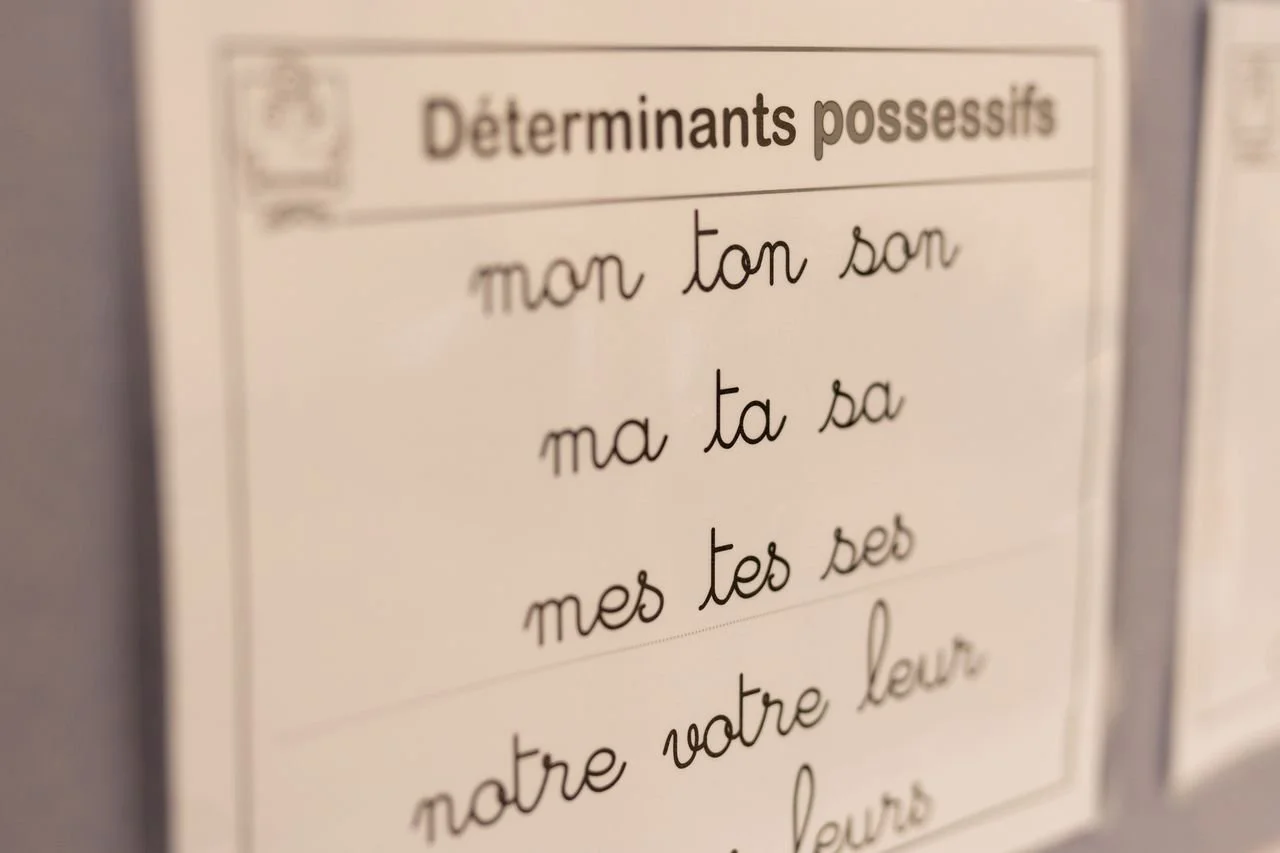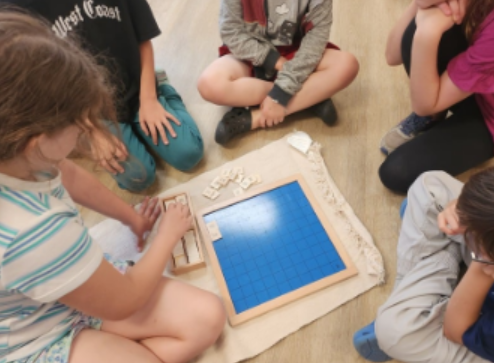
LA GRANDE ÉLÉMENTAIRE
Les Lilas’s Cycle 3 program, La Grande Élémentaire, is a mixed-age classroom for children ages 9 to 11, with one lead teacher certified in both French and Montessori education, and one assistant teacher. Les Lilas’s Cycle 3 program encompasses cours moyen 1 (CM1 or 4th grade) and cours moyen 2 (CM2 or 5th grade), and students continue to receive French immersion education through the Montessori approach.
To facilitate the transition into a more “traditional” educational system, other complementary educational tools and methods are also used, including technology and computers through carefully planned projects and lessons. Montessori materials are still incorporated, and the atmosphere continues to be one that fosters independence and respects the rhythm of each child. The materiel cultivates the students’ inquisitive and researcher minds, while helping them to memorize and develop their reasoning capabilities of abstraction.
In Cycle 3, students continue to expand their knowledge in all subjects, but mastery of the French language and basic mathematics are the primary focus of these grades. Following is a brief overview of what students learn in La Grande Élémentaire.
WHAT WILL YOUR CHILD LEARN?
READING, WRITING & LANGUAGE SKILLS
In La Grande Élémentaire, students are able to listen, express themselves in front of others, and ask questions using specific vocabulary. There is an emphasis on dictation by memorizing and reciting short texts. Reading and writing are incorporated into all subjects and activities. Students read age-appropriate and carefully selected literary texts. They are taught to identify main elements, analyze details, and form and express opinions on a text. Students engage in creative writing and research-based, non-fictional writing. Students continue to improve their grammar skills, vocabulary, and spelling in order to enhance their oral, written, and literary comprehension. They are able to differentiate between types of sentences and identify word functions. Students pay special attention to word agreement, verb conjugation, and lexical spelling.
MODERN LANGUAGE & BILINGUAL INSTRUCTION
Coming soon.
ART
Students study and practice a variety of artistic genres from different periods in history and different geographical locations. They work on transforming visual art into 3 dimensions by creating models of buildings and interiors. Through the study of art history, they learn about the artistic techniques of important periods of history and replicate the works of significant painters.
Art history
In art history, students acquire the tools and vocabulary needed to describe and analyze paintings, musical compositions, monuments, and artistic spaces and objects, that include the materials used, the dimensions, and the fabrication.
SCIENCE & TECHNOLOGY
Science
In Cycle 3, students learn more about the natural world around them and the effects that people have on it. They learn to distinguish between facts, verified hypotheses, and opinions. Students employ and strengthen their natural curiosity by observing, questioning, and practicing in the world around them. Topics covered include: matter, water, earth, sky, energy, living organisms, and the human body.
Technology
Students use computers and iPads to gather and share information for research-based projects and to communicate with their pen pals in France. They also discuss how to use web applications responsibly.
MATHEMATICS
In math, students continue to expand on their skills through problem-solving and learning various processes. They work on functions concerning whole numbers, decimals, and fractions. Students are able to solve problems mentally, on paper, and with the use of a calculator. They learn the principles of geometry and use tools such as a compass to demonstrate and practice these principles. Concepts of measurement such as time, length, and money are studied. Students integrate these mathematical elements to learn how to analyze and organize data.
MUSICAL EDUCATION
Musical education focuses on vocal games, rounds, and individual performance. Students learn about pitch, tempo, and form. They use their bodies to feel rhythm by practicing movements according to a beat.
HISTORY & GEOGRAPHY
In Cycle 3, students learn to identify and describe important periods in history. Specifically, they learn about prehistoric times, antiquity, the Middle Ages, the French Revolution, and 20th-century historical events. In geography, they explore how people live in different areas, starting on a small local level and expanding out to a global scale. They learn about various landscapes, major economies, methods of travel, and natural resources.
PHYSICAL EDUCATION
PE is critical in developing students’ self-confidence, motor skills, and athletic ability. They learn to adapt their physicality to different types of environments. Students engage in different aspects of athletics such as team sports, individual time trials, and activities aimed at strengthening their coordination and balance. Students also learn to swim at our school pool.
MORAL & CIVIC EDUCATION
Respecting others
Children are taught how to accept and respect differences and how to take responsibility for their own actions, as well as how to behave and adopt the appropriate language when dealing with others. They also learn how to take into account other people’s points of view, and to regulate and share their emotions and feelings in different situations.
Learning about & sharing of democratic values
Students learn to understand rules and legal concepts, and apply and accept them, and to know the values, principles, and symbols of France, the European Union, and other democratic societies. At the end of Cycle 3, they will know how to identify the framework of a democratic society.
Constructing a civic culture in our community
In terms of civic culture, students learn how to be part of a group and take charge of some aspects of group life and the environment, and they develop their civic and environmental awareness. At the end of the cycle, they are able to form their opinions and think critically, as well as listen to others and back their point of view in a debate or in conversation.



